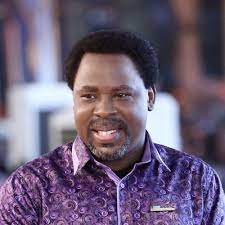One Year After BBC Expose: Did TB Joshua Commit Suicide?

By Michael Jimoh
Exactly a week before what would’ve been his 58th birthday, Nigerians were jolted by the sudden death of charismatic televangelist Temitope Balogun Joshua pastor and general overseer of Synagogue Church of All Nations. It seemed surreal at the time. At first, many Nigerians didn’t believe it. A man of God of his calibre couldn’t possibly have expired just like that. Besides, the previous day 4 June 2021, he’d ministered to a full congregation in his mezzanine-floored, magnificent edifice at SCOAN headquarters Ikotun in Lagos. He died barely 24 hours later, on 5 June.
Early signs of his demise became evident in the church’s sprawling premises where worshippers were seen bunching in stupefied silence with grief-stricken faces, benumbed with shock at the incredulous news of the passing of their beloved pastor (prophet to many of them) a man they all saw the day before in his uniquely distinct flower-patterned shirts, a trim, glistening goatee set off by his handsome, well-groomed face capped with jet-black Afro hair.
In no time, news of his death spread by word of mouth, helped along speedily by social media to as many people as possible in the shortest possible time. It was front page news for mainstream media while online publications gave minute by minute updates. It was prime time news for local channels. Foreign media such as Al Jazeera, BBC, CNN, DW, were not left out of the rush to report the biggest news story in the early second half of 2021.
By the time it became clear TB Joshua was really no more, the question was: what could possibly have done him in?
 No one had any clue. Church elders offered none, fuelling speculations about what might have killed the prophet. Writing under the headline “TB Joshua is dead,” Jemilat Nasiru of The Cable on 6 June 2021, attributed the cause of the pastor’s death to a stroke he suffered two months before. He was then flown in an air ambulance to Turkey for treatment. But video clips of his last service on 4 June where he admonished worshippers to “watch and pray” showed no evidence of a convalescing patient. According to sources, the preacher looked quite healthy, all the more surprising when news of his death broke the following day.
No one had any clue. Church elders offered none, fuelling speculations about what might have killed the prophet. Writing under the headline “TB Joshua is dead,” Jemilat Nasiru of The Cable on 6 June 2021, attributed the cause of the pastor’s death to a stroke he suffered two months before. He was then flown in an air ambulance to Turkey for treatment. But video clips of his last service on 4 June where he admonished worshippers to “watch and pray” showed no evidence of a convalescing patient. According to sources, the preacher looked quite healthy, all the more surprising when news of his death broke the following day.
TB Joshua would’ve been a year older on 12 June 2021 had he lived. Of course, there would’ve been the obligatory celebratory toasts from thousands of worshippers in Lagos, from far-flung places like Botswana, Ghana, Germany, Namibia, South Africa, South America, South Korea, the United Kingdom and the United States. There would’ve been thousands of adulatory birthday greetings from presidents and paupers, politicians, businessmen and traders, Nollywood heavies and has-beens, fellow clergymen and the laity – all of them wishing him good health, long life and the courage to continue to shepherd the flock as he he’d done for more than three decades when he began ministering the word, starting with an audience of barely a dozen worshippers in a poky, plank building under a corrugated roofing sheet canopy.
Instead, on 5 June of that year, news of his demise caught everyone by surprise. Though cause of death remains unknown to this day, the senior hierarchy of SCOAN insinuated that the revered man of God had some premonition of his death, which TB Joshua himself hinted at. In the last service he conducted, he was quoted as saying that “it was time to go home,” or something to that effect, a veiled allusion to his departure for the celestial home after death and not his natal home in Arigidi Ondo state where he was born on 12 June 1963.
There is no record of any autopsy performed before his burial four days later in a mausoleum in the church’s premises. If any was done, it was never made public.
Therefore, the secrecy shrouding the unexpected death of one of Nigeria’s most enigmatic evangelists has only piqued the public’s interest. Even now, there’s a renewed interest in what the possible cause of death was. Was he done in by stroke as The Cable journalist suggested? Was cancer the cause as some others speculated? Is there any truth to the rumour that he took his own life after being tipped off in 2021 that the Beeb had commenced a full investigation on allegations of rape and brutality by some of his church members?
To be sure, much of those allegations are now in the public domain ever since the BBC published “Disciples: The Cult of TB Joshua” in two episodes – audio, video and print – exactly a year ago on January 7 under the African Eye programme.
Before then, he was arguably one of Nigeria’s most engaging televangelists. He also seemed untouchable. In fact, it was not that some aggrieved members, especially female members of his church whom he’d serially sexually abused, had not spoken up before. No one paid them any mind. Instead, they were either intimidated and bullied to silence or just done away with. Rumour also had it the man of God maintained a coterie of thugs forever at his service to carry out such minatory orders. To his advantage, also, his SCOAN headquarters attracted world leaders, A list sportsmen and women, actors and businessmen, forever shoring up his credibility. For instance, he counted among his friends at least three former African heads of government, all of them having gone on their knees for deliverance from one spiritual affliction or the other. Some other pilgrims to SCOAN went for different reasons, deliverance from ailments such as HIV-AIDS TB Joshua reputedly cured simply by laying his hand on the sufferer. He was also known for his charitable works to the less privileged, notching up his popularity and humility in the eyes of many.
 But, as the BBC expose has shown, there was also another side to the preacher, a side less seen and known to the public. “Disciples: The Cult of TB Joshua” is the result of painstaking investigation into the seamy side and egregious past of the famed preacher. Once it was aired and published, it went viral instantly, spawning public debate for sometime in Nigeria and abroad. With the disclosure, a Nigerian journalist commented that TB Joshua’s mystique was blown away. “TB Joshua’s private life was completely different from what the public saw of him on stage as a minister of God.”
But, as the BBC expose has shown, there was also another side to the preacher, a side less seen and known to the public. “Disciples: The Cult of TB Joshua” is the result of painstaking investigation into the seamy side and egregious past of the famed preacher. Once it was aired and published, it went viral instantly, spawning public debate for sometime in Nigeria and abroad. With the disclosure, a Nigerian journalist commented that TB Joshua’s mystique was blown away. “TB Joshua’s private life was completely different from what the public saw of him on stage as a minister of God.”
Among the women interviewed by the BBC were Brits, French, Germans, Ghanaians, Koreans, a Namibian, Nigerians, a Russian and so on. Together, “they all had the same story to tell the Beeb, heart-wrenching tales of rape, of torture and forced camping in the church’s premises against their wish.”
One of them, Rae, a Briton from Brighton flew to Lagos to be cured, so she assumed, of being gay. Prior to coming to Nigeria, she had seen video cassettes of TB Joshua healing all manner of diseases and demonic possession. She thought and hoped the man of God would find a solution to her disturbing sexual orientation. It was a false hope as TB Joshua violated her and literarily turned her into a sex slave for more than 20 years.
More than two dozen women voluntarily spoke to the BBC on their traumatizing experience with the man of God they ran to for succor but who systematically, forcefully and deliberately took advantage of their vulnerability. “Evidence of widespread abuse and torture by the founder of one of the world’s biggest Christian evangelical churches has been uncovered by the BBC,” the report bylined by Charlie Northcott and Helen Spooner began. “Dozens of ex-Synagogue Church of all Nations members – five British – allege atrocities, including rape and forced abortions, by Nigeria’s late TB Joshua. The allegations of abuse in a secretive Lagos compound span almost 20 years.”
Summing up the experiences of other victims of TB Joshua, Rae rued that “we all thought we were in heaven, but we were in hell, and in hell terrible things happen.” Rae contemplated “suicide multiple times.”
She was not alone. Jessica Kaimu from Namibia had exactly the same disposition after TB forcefully violated her. She was, like Rae, a member of select group of church workers called Disciples who lived within the high-walled fence of SCOAN. In the interview with the Beeb, she recalled instances of forced abortions with no thought for hygiene in the church’s clinic. Suicidal thoughts were not far from her all through that dehumanising period.
Before many of TB Joshua’s victims came to Nigeria, precisely to SCOAN, they saw him as their saviour, someone they looked up to to fill the void in their spiritual life, to heal a persistent ailment they’d suffered for months, years. And you couldn’t fault them because, as one writer volunteered of another charismatic preacher in another place, another time, he “sounded good, offering hope for the future and requiring morality and kindness towards others.”
That observation was made by Californian Jeffrey M Key in a letter to TIME magazine of 5 May 1997 concerning the largest ever mass suicide in America orchestrated by Heaven’s Gate cult leader Marshall Herf Applewhite. Along with Applewhite, hundreds of his followers killed themselves hoping to be spirited away in a space ship far from the maddening crowd and corruptible species populating the earth.
Of course, that would not be the first such zombie-like mass suicide in Christendom. In mid-November 1978, nearly a thousand members of Peoples Temple led by Reverend Jim Jones committed mass suicide by drinking from a cyanide-laced punch in a forest in Guyana. In Waco Texas, another charismatic churchman David Koresh of the Branch Davidian killed himself with a gunshot to the forehead instead of surrendering to American law enforcement agents after a 51-day siege which began on 28 February – 19 April 1993.
Fearful of a possible trial, conviction and sentencing to a long jail term, both Jones and Koresh took their lives to avoid the ignominy that was sure to follow their arrest.
Discerning commentators on TB Joshua’s sudden death proffer a similar argument. Once apprised of the BBC investigation in 2021, plus the possible publicity fiasco it would’ve caused, some analysts aver that the only way out of the imminent disgrace for him was to exit the stage – like his manipulative and criminal colleagues in the pulpit.



